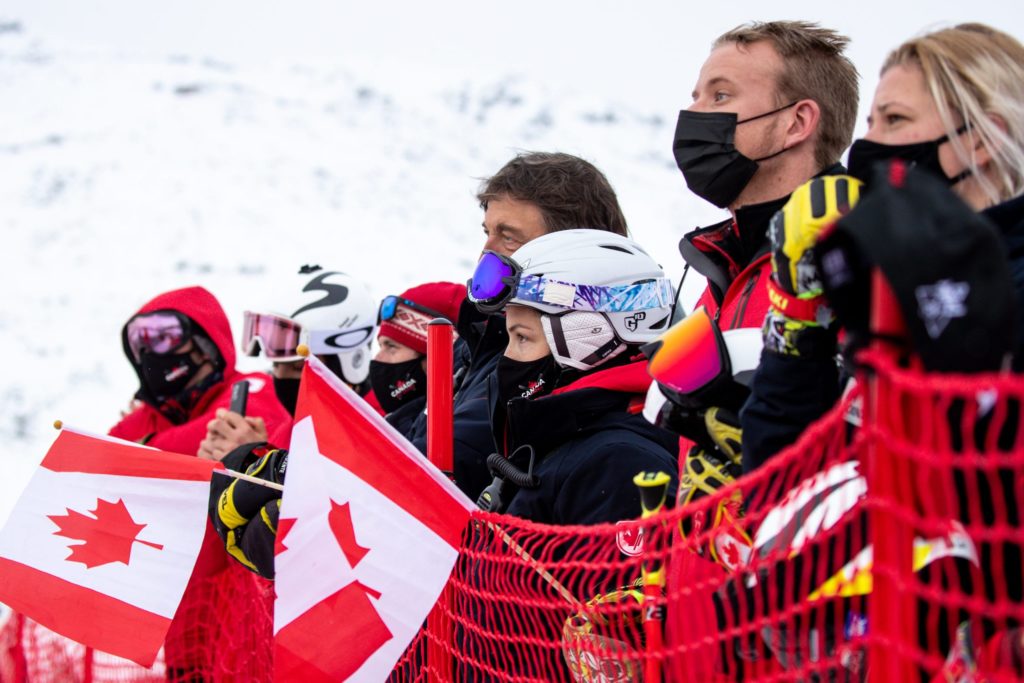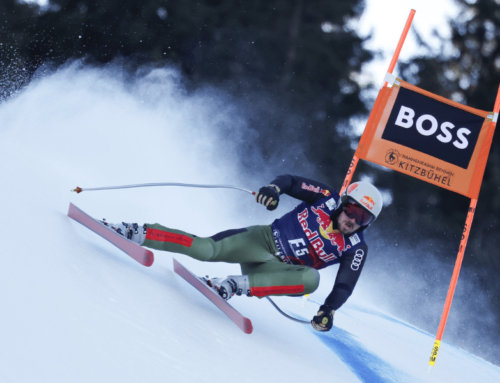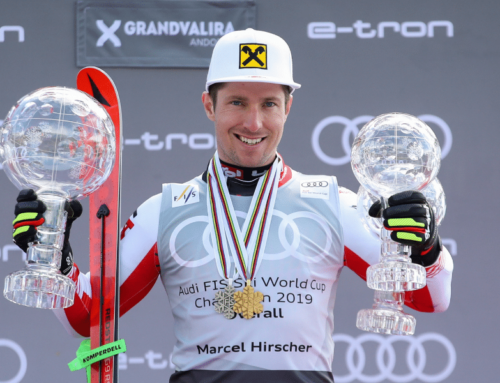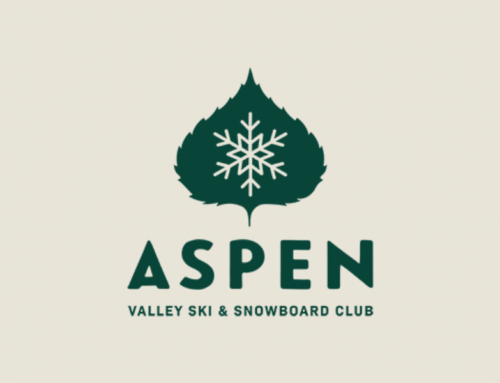Alpine Canada boss: ‘We want to win and we make no apologies for that’
Quoting English literature in one breath and commenting how cultural changes could push Canada to the forefront of the ski world with the next, Alpine Canada’s CEO Thérèse Brisson remains optimistic for a brighter future.
Canada’s alpine team endured challenges likely never to be repeated after a season of a few highs and even more lows.
“In terms of athletic performance it was extraordinary,” Brisson said on a video call from her home in Mississauga, Ontario. “But extraordinarily challenging … and Canada had an extreme competitive disadvantage with the travel restrictions and quarantines.”
“You know that Charles Dickens line ‘It was the best of times, it was the worst of times’? It was a bit of that for sure,” she said.
Nine months into the job as the leader of Alpine Canada, Brisson was more than impressed with the team’s ability to adapt.
“The athletes, teams and coaches responded with incredible creativity and resilience,” she said. “I was very proud of the teams and think that we had a great year in terms of athletic performances.”
Brisson cited the continued dominance of the national ski cross team – which garnered a crystal globe (Reece Howden, men’s overall) and the emergence of the next wave of ski cross talent, particularly on the women’s side.
Brisson was equally excited with the athletic performance with the alpine team – even though the group finished 10th in the FIS Nations Cup with roughly 10% of the World Cup points of world-leading Switzerland and less than a third of the total points of the U.S. Ski Team who also had similar travel and Covid-related challenges.
“Holy smokes, some great performances,” she said. “Marie-Michelle Gagnon finding her way in speed on the podium and remarkable performances with Erin [Mielzynski] and Laurence [St-Germain] both moving up their rankings before an Olympic year.”
The Canadian men’s team, which endured an injury-riddled campaign sprinkled with some notable finishes from up-and-coming racers, had a relatively mediocre season with one racer in the top 50 overall World Cup standings (Erik Read, 48th) and three in the top 100. The top overall discipline rank was Erik Read’s 20th in giant slalom and James Crawford’s 24th overall in super-G.
Gold Medal Pathway to 2026 and 2030

According to Brisson, the focus of Alpine Canada remains on effective delivery of a strategic plan and a renewed focus on funding all aspects of this plan.
With experience as a high-level marketing executive for consumer products, combined with elite sports leadership with Own the Podium and the Canadian Olympic Committee, Brisson is no stranger to the critical role of long and short-term planning.
At a recent national summit, which brought together national and provincial staff, coaches and directors focussed on a “Made for Canada: Strategic Plan 2021-2026.” The four-day zoom meeting covered the plans and strategies of high performance program delivery between the provinces and Alpine Canada.
The talent identification process of NextGen skiers and the “Podium Pathway” of the long-term athlete development model – mixed with current economic and systematic challenges – were discussed by technical and executive leaders.
“Our winning aspiration is to be a world-leading ski racing nation, that is inspired by the passion of Canada’s ski team,” Brisson said. “We are going into an Olympic year poised for podium performances for the first time in a while. And I’m very excited about the next group, we have some younger athletes who will be gaining more experience as they move towards 2026. And then the 2030 group … they will quickly become the NextGen and there’s a group of about 18 athletes there that we’re really excited about.”
According to Brisson, Alpine Canada pays less attention to the FIS Nations Cup – where alpine leaders such as Switzerland and Austria have a substantially larger roster – and focus more on podium performances at major events such as the world championships and Olympic games.
“That for us is world leading,” she explained. “This isn’t as much as a Nations Cup points discussion but I tell you we’re here to win. That’s a bit of a cultural adjustment. We don’t want skiers trying to ‘make the team’ as we want to win and we make no apologies for that.”
Shared vision for a ‘Gold Medal Profile’

With the focus squarely on major event podium finishes, Brisson commented the relationship between Alpine Canada and the provinces is crucial to developing talent from the bottom up.
“For athletes to have podium potential at a major games we know that they need to have the sufficient training, volume and world-class coaching … and they need to be ranked high within their age,” she explained. “How we work with the provinces to enhance their programming [is important] so that they’re ready to continue to make progress.”
“If we’re not capable as a nation of developing athletes to be in the top 20 world ranking their age or younger, the chances of those athletes making a podium later on is something like less than 0.4 percent.”
With Alpine Canada’s selection process targeting athletes at ‘C team’ and above status, the heavy lifting for development of those skiers is driven at the provincial level, which oversees club and regional programming.
“We need to re-orient our system to help athletes progress to that level with the right intensity, coaching and competitive exposure. A lot of that work happens at the provincial level so we need to be clear about what that podium pathway and the gold medal profile looks like.”
Brisson’s vision of the podium pathway is an evidence-based approach which looks at the holistic view of the composition of a top-level skier, and the steps required to reach that level.
“We need to look at all aspects of sport performance from fitness levels to psychological and emotional profiles, lifestyle and habits,” she said. “We need good evidence and data profiles and we see this is as our role as the national organization to help everyone understand what that looks like. Part of the summit was socializing some of that work so that everyone knows and understands the path.”
Brisson also looks to a future with more domestic skiing, bigger and better events and a more cost-efficient process to developing future champions.
“We need to create scale and affordable access to training domestically,” she said. “We have the best training conditions in early winter and spring. If we can create scale and long term partnerships with the key resorts that could really unlock the secret sauce that we need to develop athletes domestically in a way that would be really different and more effective.”
Notable men’s national team staff changes
- Nick Cooper – After seven seasons leading the B.C. Ski Team, Cooper was appointed as the head of the men’s Kombi/Europa Cup team. Cooper will be assisted by returning coach Elias Jonsson.
- Conrad Pridy – Former World Cup racer who has been coaching with the Whistler Mountain Ski Club for a few years will take on the assistant coach role with the men’s speed group.
- Mark Tilston – last season’s men’s head coach has a shift in responsibilities to lead performance sciences as well as program, logistics and budget for the men’s program while providing coaching support across all men’s groups.
- John Kucera will continue to lead the men’s speed group assisted by Chris Powers, Conrad Pridy, and Serge Dugas.
- Dusan Grasic, men’s technical head coach, and men’s strength & conditioning and assistant coach Agneta Platter have both left the organization to pursue other interests.
Alpine Canada staff changes
- Jeff Thompson – added as Vice-President of Domestic Sport Programs and Events. Thompson spent his career in senior leadership positions within Canadian sport. Former head coach with the National Ski Academy in Collingwood, Ont., and Executive Director of Alpine Ontario. Spent the last 18 years with as the Chief Sport Officer for Golf Canada. See full article.





















